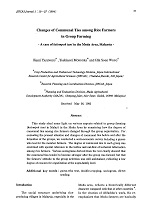This study shed some light on various aspects related to group farming (kelompok tani in Malay) in the Muda Area by examining how the degree of communal ties among rice farmers changed through the group organization. For evaluating the present situation and changes of communal ties before and after the formation of the groups, we conducted a socio-economic survey including a guess-who test for the member farmers. The degree of communal ties in each group was examined with special reference to the in-flow and out-flow of technical information among rice farmers. Various sociograms derived from the test clearly showed that the communal ties tended to become stronger after the group was formed, but that the farmers' attitude to the group activities was still ambivalent, reflecting a low degree of concern for organization at the supra-family level.

